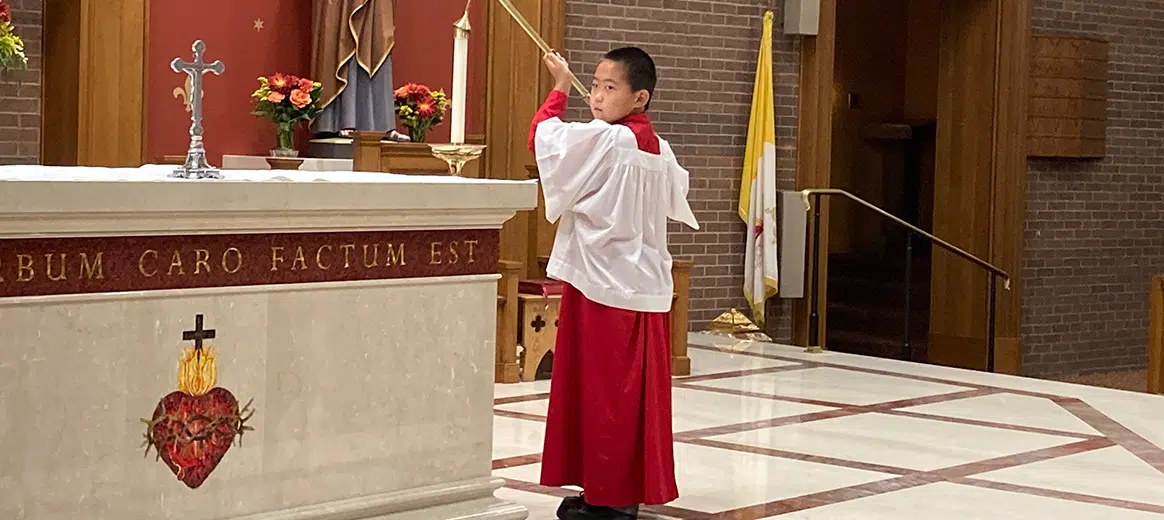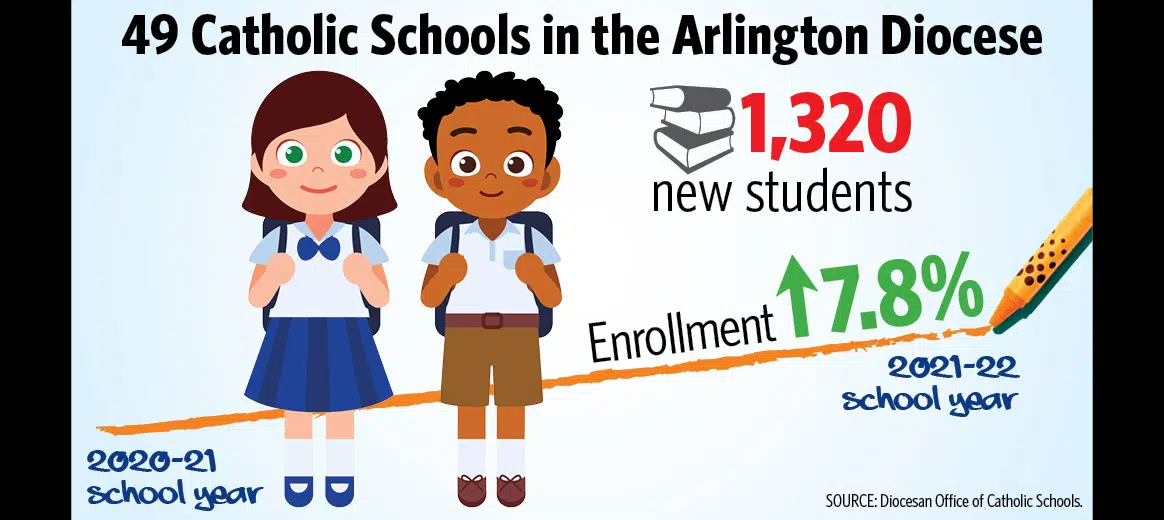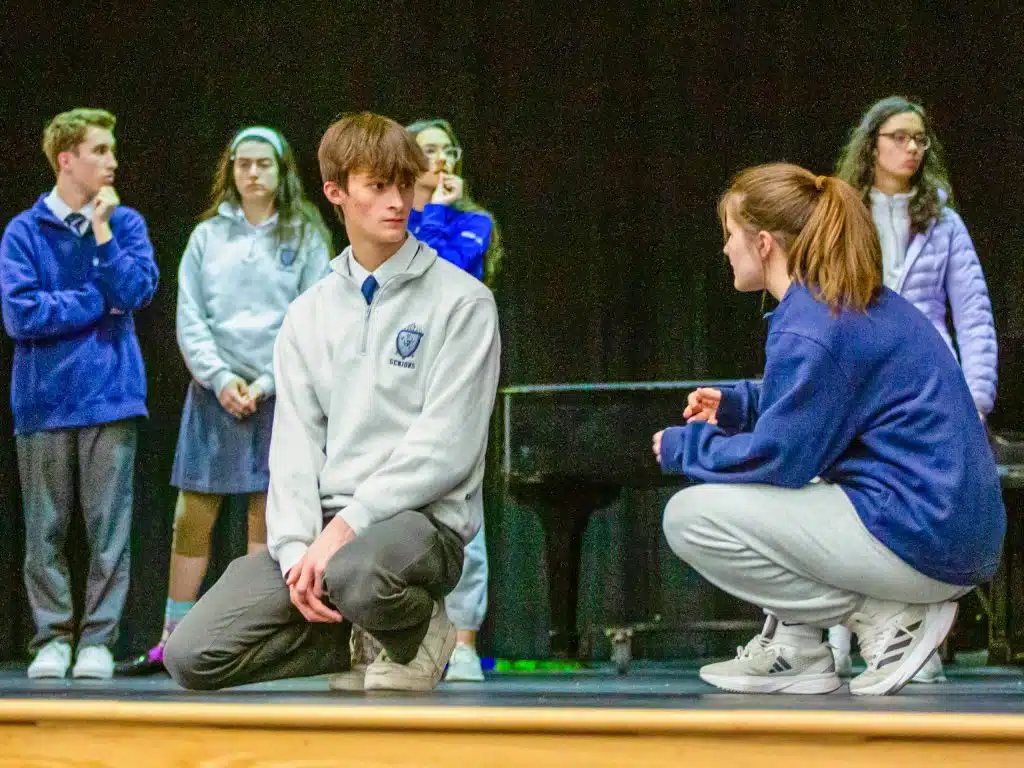The world was shutting down, but Logan Foote told his parents he didn’t want to.
“He looked at us in the summer of 2020 and said, ‘I can’t do virtual learning anymore,’ ” recalled his mother, Sarah. He wanted to attend Our Lady of Good Counsel School in Vienna instead.
Like much of the country, her then-rising seventh grader had been in virtual learning since March, and Fairfax County had announced it was going to be virtual for the foreseeable future.
“We were very fortunate OLGC had a space for him,” Sarah said, calling her son the “driving force” behind their enrollment decision. This year, he is in eighth grade and was joined by his younger brother, who had been at a private, non-Catholic school in the area.
“We had a great experience (last year). Logan was really pushed and challenged academically. We wanted the same experience for Noah,” she said.
OLGC is one of numerous diocesan schools seeing sustained enrollment growth during the pandemic, despite the return to in-school learning for public schools.
As of Oct. 1, the schools office said 18,080 students enrolled in Catholic schools in the diocese for the current year — an increase of more than 7.8 percent from last year. There are 37 elementary schools, four high schools, three early childhood centers, and five independent schools in the diocese.
Joseph Vorbach, diocesan superintendent of schools, said in an interview this was the first time in 15 years the numbers have been this high. He credited the schools and their respective leadership for the growth.
“I know the extraordinary efforts the principals and teachers achieved last year and those achievements brought attention to the fact that Catholic schools can do a lot,” Vorbach said. “I salute the people at the schools, they stepped up (during COVID-19) in a big way.”
Many parents from various diocesan schools talked about the importance of Catholic education and the foundations — both spiritually and academically — the schools provide. Catholic schools help to bring the lessons and values taught at home to life, they said.
A number of parents said they weren’t considering Catholic schools before the pandemic, but now won’t go back because they realized what they were missing and how strong and dedicated Catholic school leaders are, especially when it comes to educating all children.
For others, the final straw was the bureaucratic hiccups and inflexibility they encountered from public school administrators unwilling to work with them to help best educate their children. One parent said he made the switch when he walked in on his child’s Zoom class being conducted from the teacher’s bathroom.
Principal Darcie Girmus — like many of her students — is new to St. Bernadette School in Springfield, having taken over as principal in July. She credits the teachers for the growth of the school and said the pandemic has had unexpected benefits, including increased diversity and opportunities for growing the faith.
“We are really diverse in every way,” she said, noting students come from different socio-economic backgrounds, ethnicities and religions. “And as a Catholic school, that provides us with an opportunity for evangelization because of the large number of non-Catholics in our school. We plant seeds that may take root in the future.”
Adrianne Jewett, OLGC principal, is gratified that so many pandemic families stayed. During each of the last two summers, the school had a waiting list of more than 200 students. Enrollment has gone from 385 when the pandemic hit to 470 now.
“I think a lot of people checked us out during the pandemic and saw that Catholic schools are a great opportunity and that the students can get a strong academic foundation,” said Jewett, who is in her fourth year as principal. “The word is out that Catholic schools are doing a good job, if not a better job” than other schools in the area.
That was Heather Howard’s experience when she moved her children from public school to Holy Spirit School in Annandale. She said before COVID-19 hit, she and her husband were planning to stick with Fairfax County Public Schools because of their strong reputation. But when the schools shut down, they quickly learned virtual learning was not the way to best educate their son. She now has two children at Holy Spirit, a third grader and a kindergartener.
The move to Catholic school “was driven by the pandemic but we really found that Holy Spirit was the silver lining to it all,” said Howard. “It has been a blessing in the midst of the other things going on.”
Maureen Ashby, principal at Holy Spirit, said parents seem to appreciate the methods the school uses, such as teaching cursive and multiplication tables.
“Catholic schools have the right balance between traditional methods, as well as (modern) technology,” she said. “Parents are looking for a return to basics, not that they are discounting technology, but I also think they want a focus on morality and how it can be infused across the subjects, especially on the primary level.”
Vorbach agreed. He said in order for schools to maintain the growth they must continue to do “the essential things,” including getting to know the students and families personally, and not just as a name. They must make the families feel welcome and continue to share “the very positive news about the leadership both from the pastors and the principals.”
Jill Bender has sent her fifth grade son, who has special needs, to both public and private schools, but Holy Spirit stands out above the others, she said. It’s a 30-minute drive from their house to school, but Bender said she wouldn’t have it any other way.
“He’s a prayerful kid, even though he has special learning needs,” she said, noting he has become an altar boy. “His teachers truly love him, and his previous teachers were never really able to know him on a spiritual level. His teachers now balance the need of challenging him, but not making him do things outside of his abilities.”
For Meghan Holligan, mother to twin boys in sixth grade who started at Queen of Apostles in Alexandria this year, the decision came down to making sure her sons would thrive. For years she said she fought Alexandria City Public Schools to get the right resources for her sons, only to be told she had to wait for them to fall two years behind academically before she could get the help they needed.
Now, at Queen of Apostles, she said her sons are scoring high on standardized tests and getting the resources from teachers and administrators — academically, socially and spiritually — that they weren’t getting before.
She’s involved, too. She helped organize the school’s fall festival in October and thinks the world of the principal and the community.
“There were so many reasons to leave, but what started as a primary academic reason has become so much more. I love that my kids now are not allowed to fail. And I don’t mean just in school, I mean in life.”
Shaffrey is a freelancer in Alexandria.




